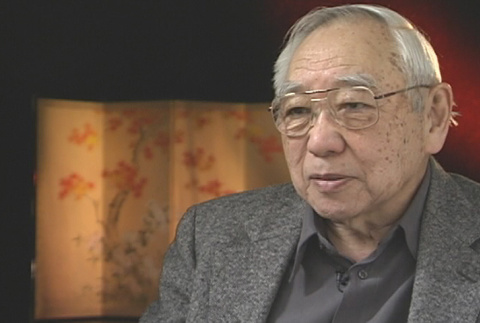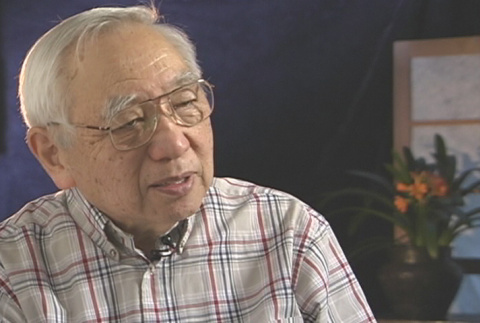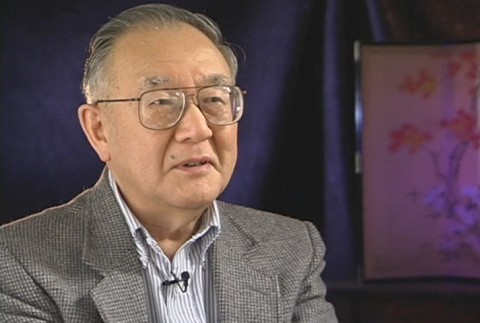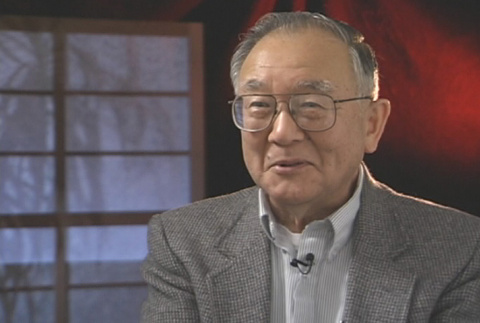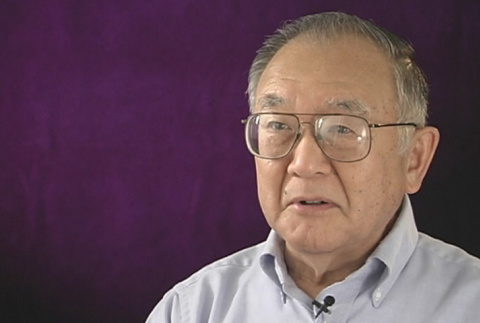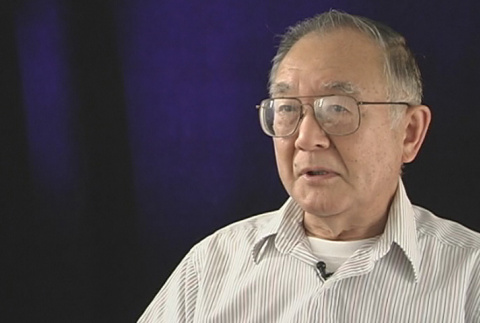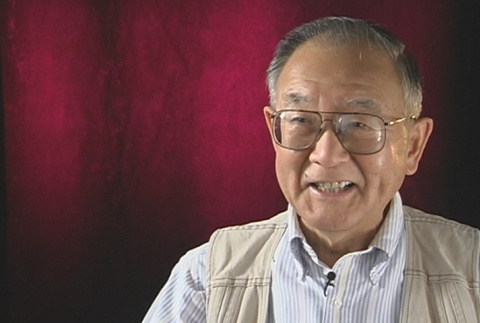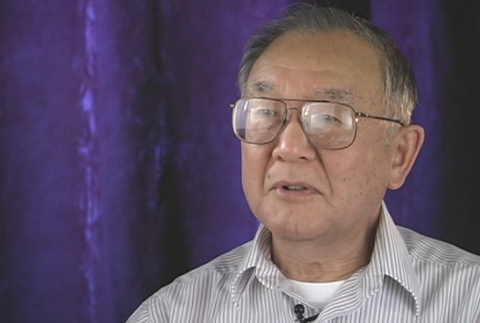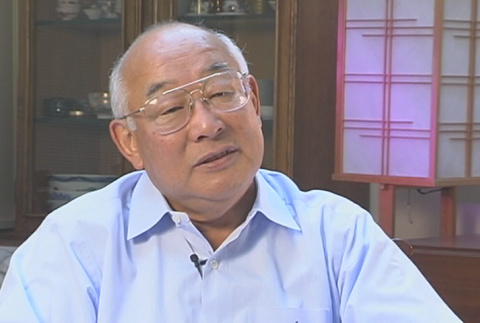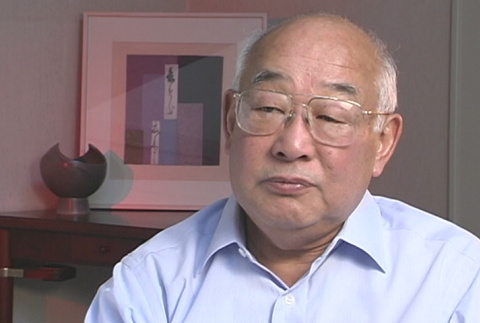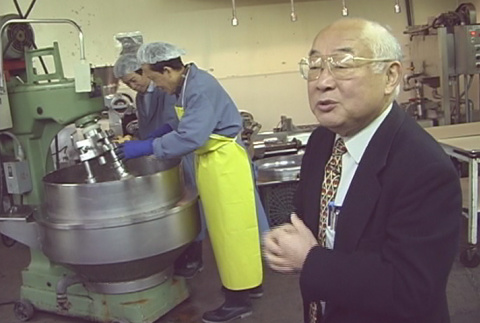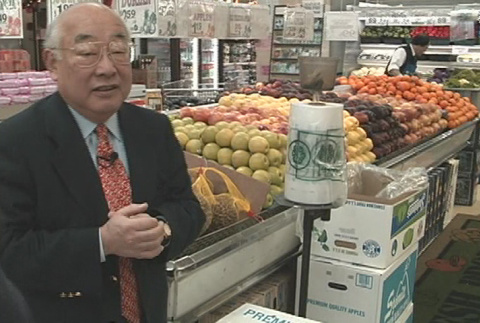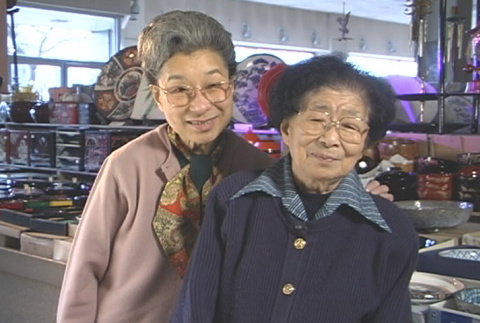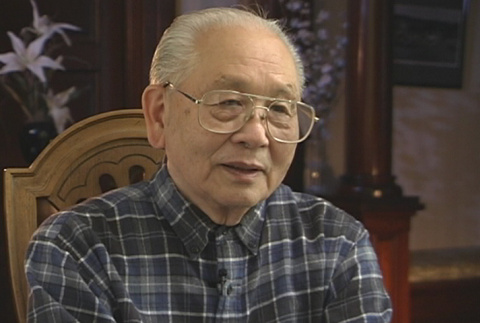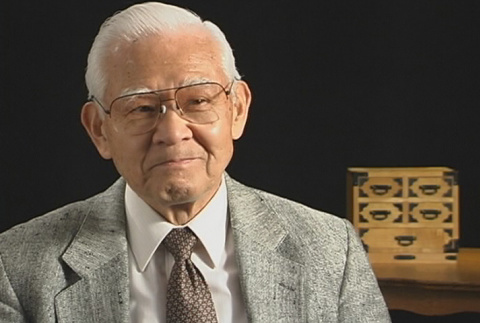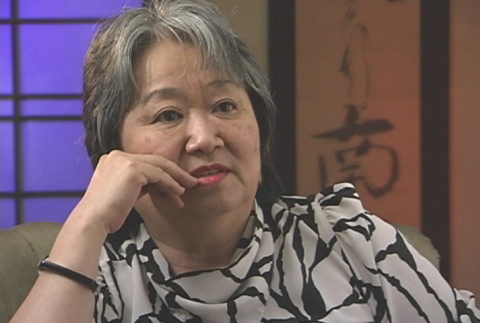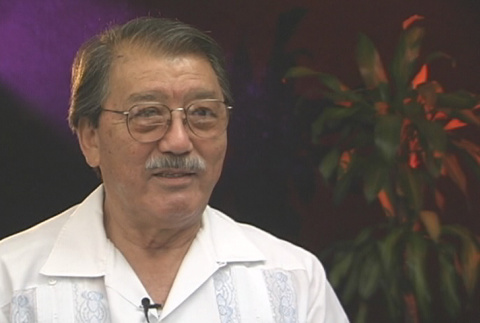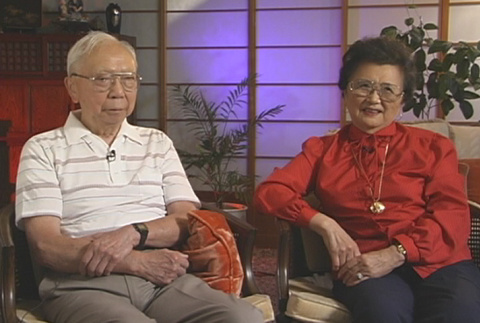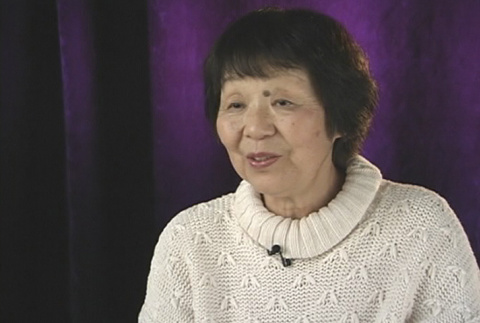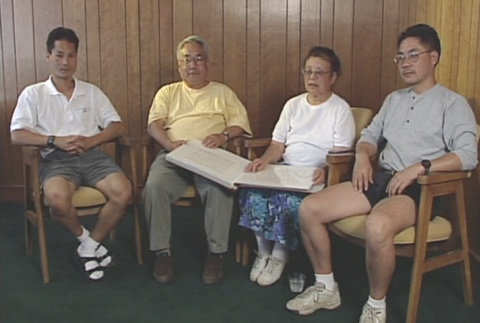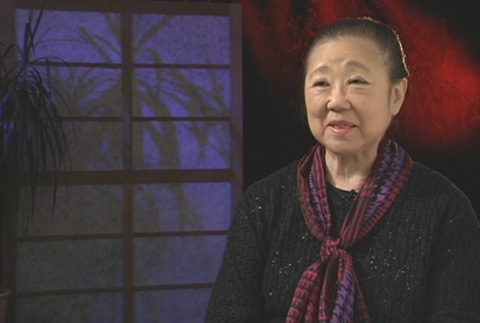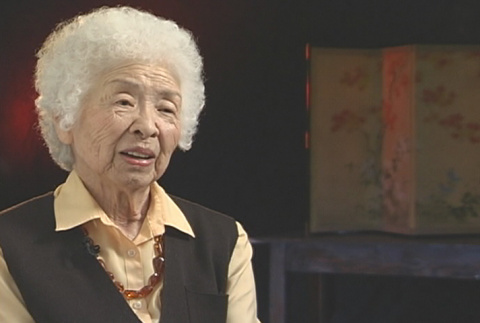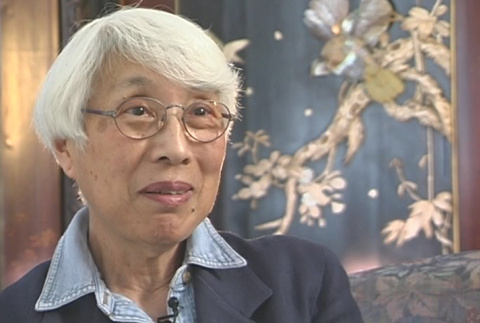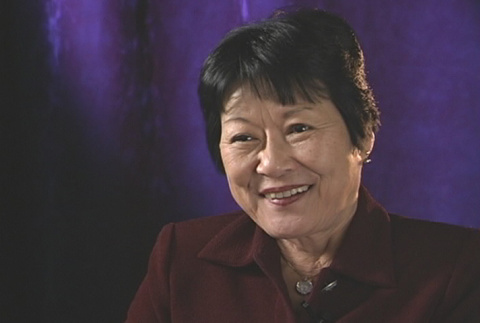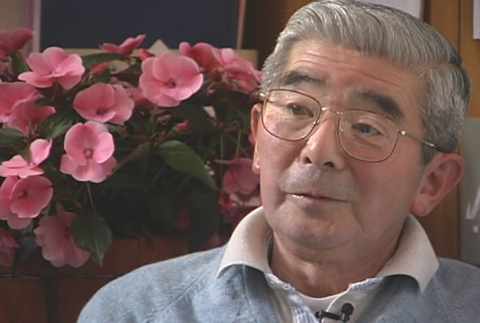Densho Visual History Collection ddr-densho-1000
513 items
513 items
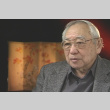
vh
Frank Miyamoto Interview II (ddr-densho-1000-51)
Nisei male. Born July 29, 1912, in Seattle, Washington. Wrote 'Social Solidarity Among the Japanese in Seattle' as a Master's thesis, published in 1939 as one of the first academic works on the Japanese immigrant community. Incarcerated in Tule Lake concentration camp, California. Member of the Evacuation and Resettlement Study which studied the incarceration and resettlement …
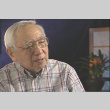
vh
Frank Miyamoto Interview III (ddr-densho-1000-52)
Nisei male. Born July 29, 1912, in Seattle, Washington. Wrote 'Social Solidarity Among the Japanese in Seattle' as a Master's thesis, published in 1939 as one of the first academic works on the Japanese immigrant community. Incarcerated in Tule Lake concentration camp, California. Member of the Evacuation and Resettlement Study which studied the incarceration and resettlement …
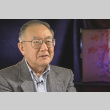
vh
Henry Miyatake Interview I (ddr-densho-1000-53)
Nisei male. Born April 28, 1929, in Seattle, Washington. Incarcerated at Puyallup Assembly Center and Minidoka concentration camp, Idaho. Had some key childhood experiences with discrimination that made him a self-described, "independent thinker," and later, an influential figure in the Japanese American community. While a teenager in camp, he wrote and defended an essay criticizing the …
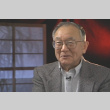
vh
Henry Miyatake Interview II (ddr-densho-1000-54)
Nisei male. Born April 28, 1929, in Seattle, Washington. Incarcerated at Puyallup Assembly Center and Minidoka concentration camp, Idaho. Had some key childhood experiences with discrimination that made him a self-described, "independent thinker," and later, an influential figure in the Japanese American community. While a teenager in camp, he wrote and defended an essay criticizing the …
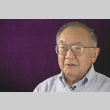
vh
Henry Miyatake Interview III (ddr-densho-1000-55)
Nisei male. Born April 28, 1929, in Seattle, Washington. Incarcerated at Puyallup Assembly Center and Minidoka concentration camp, Idaho. Had some key childhood experiences with discrimination that made him a self-described, "independent thinker," and later, an influential figure in the Japanese American community. While a teenager in camp, he wrote and defended an essay criticizing the …
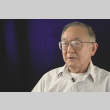
vh
Henry Miyatake Interview IV (ddr-densho-1000-56)
Nisei male. Born April 28, 1929, in Seattle, Washington. Incarcerated at Puyallup Assembly Center and Minidoka concentration camp, Idaho. Had some key childhood experiences with discrimination that made him a self-described, "independent thinker," and later, an influential figure in the Japanese American community. While a teenager in camp, he wrote and defended an essay criticizing the …
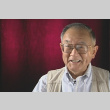
vh
Henry Miyatake Interview V (ddr-densho-1000-57)
Nisei male. Born April 28, 1929, in Seattle, Washington. Incarcerated at Puyallup Assembly Center and Minidoka concentration camp, Idaho. Had some key childhood experiences with discrimination that made him a self-described, "independent thinker," and later, an influential figure in the Japanese American community. While a teenager in camp, he wrote and defended an essay criticizing the …
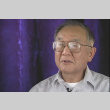
vh
Henry Miyatake Interview VI (ddr-densho-1000-58)
Nisei male. Born April 28, 1929, in Seattle, Washington. Incarcerated at Puyallup Assembly Center and Minidoka concentration camp, Idaho. Had some key childhood experiences with discrimination that made him a self-described, "independent thinker," and later, an influential figure in the Japanese American community. While a teenager in camp, he wrote and defended an essay criticizing the …
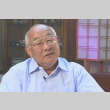
vh
Tomio Moriguchi Interview I (ddr-densho-1000-59)
Ni-ten-gosei (Nisei/Sansei) male. Born April 16, 1936, in Tacoma, Washington. During World War II, was incarcerated with his family at the Tule Lake concentration camp, California. After the war, resettled in Seattle's Nihonmachi, where his father reestablished the family business, Uwajimaya, selling Japanese foodstuff and other items. Worked at Uwajimaya throughout his childhood -- along with …
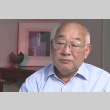
vh
Tomio Moriguchi Interview II (ddr-densho-1000-60)
Ni-ten-gosei (Nisei/Sansei) male. Born April 16, 1936, in Tacoma, Washington. During World War II, was incarcerated with his family at the Tule Lake concentration camp, California. After the war, resettled in Seattle's Nihonmachi, where his father reestablished the family business, Uwajimaya, selling Japanese foodstuff and other items. Worked at Uwajimaya throughout his childhood -- along with …
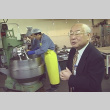
vh
Tomio Moriguchi Interview III (ddr-densho-1000-61)
Ni-ten-gosei (Nisei/Sansei) male. Born April 16, 1936, in Tacoma, Washington. During World War II, was incarcerated with his family at the Tule Lake concentration camp, California. After the war, resettled in Seattle's Nihonmachi, where his father reestablished the family business, Uwajimaya, selling Japanese foodstuff and other items. Worked at Uwajimaya throughout his childhood -- along with …
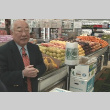
vh
Tomio Moriguchi Interview IV (ddr-densho-1000-62)
Ni-ten-gosei (Nisei/Sansei) male. Born April 16, 1936, in Tacoma, Washington. During World War II, was incarcerated with his family at the Tule Lake concentration camp, California. After the war, resettled in Seattle's Nihonmachi, where his father reestablished the family business, Uwajimaya, selling Japanese foodstuff and other items. Worked at Uwajimaya throughout his childhood -- along with …
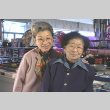
vh
Ayako Murakami - Masako Murakami Interview (ddr-densho-1000-63)
This interview was conducted with sisters Masako and Ayako Murakami, who were coproprietors of the Higo Variety Store in Seattle's International District. Both sisters were incarcerated at the Puyallup Assembly Center, Washington, and Minidoka concentration camp, Idaho. Both resettled in Seattle, Washington, after the war
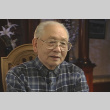
vh
Richard Murakami Interview (ddr-densho-1000-64)
Nisei male. Born 1914 in Nemah, Washington. His family owned and operated Eagle Oyster Packing Company in Nahcotta, Washington. Incarcerated at the Tule Lake concentration camp, California. Returned to Nemah following the war, where his family had to fight to get the company back. Eventually, sold the business to Coast Oyster Company and stayed on as …
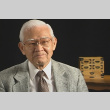
vh
Paul Nagano Interview (ddr-densho-1000-65)
Sansei male. Born, June 17, 1920, in Los Angeles, California. Grew up in "Little Tokyo," and the Boyle Heights area. During World War II, was removed to the Poston concentration camp, Arizona. Became ordained as a Baptist minister while incarcerated, ministering to fellow camp inmates and leading ecumenical worship services in camp. Left Poston to attend …
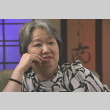
vh
Mako Nakagawa Interview (ddr-densho-1000-66)
Nisei female. Born February 1, 1937, in Seattle, Washington. Spent prewar childhood in Seattle. Incarcerated at the Puyallup Assembly Center, Washington; Minidoka concentration camp, Idaho; and Crystal City internment camp, Texas. In the postwar years, became a teacher, principal, and multicultural specialist for Washington State's Superintendent of the Office of Public Instruction. Developed and directed the …
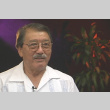
vh
Bert Nakano Interview (ddr-densho-1000-67)
Nisei male. Born March 5, 1928, in Honolulu, Hawaii. Incarcerated at the Jerome concentration camp, Arkansas. Resettled in Gardena, California. Member of the Little Tokyo People's Rights Organization (LTPRO) and National Coalition for Redress/Reparations (NCRR).
(This interview was conducted at the Voices of Japanese American Redress Conference, held on the UCLA campus and sponsored by the …
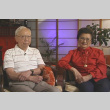
vh
Isami Nakao - Kazuko Nakao Interview (ddr-densho-1000-68)
This interview is with Isami and Kazuko Nakao, both from Bainbridge Island, Washington. During World War II, they were removed to the Manzanar concentration camp, California, then later transfer to the Minidoka concentration camp, Idaho. They married while at Minidoka, and returned to Bainbridge Island after the war.
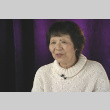
vh
Hiroko Nakashima Interview (ddr-densho-1000-69)
Kibei female. Born 1927 in Spokane, Washington. Went to Japan at the age of twelve with her mother and sister to visit relatives and gain a "Japanese education." Was in Japan when World War II broke out, remaining there for the duration of the war. Returned to the United States soon after the war ended, married …
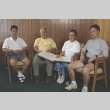
vh
Yaeko Nakano - Hiroshi Nakano - Kenichi Nakano - Stanley Nakano Interview (ddr-densho-1000-70)
In this interview, Yaeko Nakano and her three sons, Kenichi, Hiroshi and Stanley, reflect on the incarceration experience and its impact, in the context of the Tule Lake Pilgrimage.
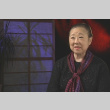
vh
Martha Nishitani Interview (ddr-densho-1000-71)
Nisei female. Born February 27, 1920, in Seattle, Washington. Family owned and operated the Oriental Gardens, the first nursery in Lake City. Incarcerated at Puyallup Assembly Center, Washington, and Minidoka concentration camp, Idaho. An award-winning modern dancer who established the Martha Nishitani Modern Dance School and Martha Nishitani Modern Dance Company, she also choreographs for modern …
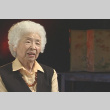
vh
Fumiko M. Noji Interview (ddr-densho-1000-72)
Nisei female. Born October 13, 1909, in Bellingham, Washington. Lost her United States citizenship when she married an Issei through an arranged marriage. Before 1920, her husband's family established Columbia Greenhouse, one of the first Japanese American-owned greenhouse businesses. Incarcerated at Puyallup Assembly Center, Washington, and Tule Lake concentration camp, California. Husband was held by the …
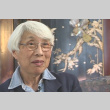
vh
Chizuko Norton Interview (ddr-densho-1000-73)
Nisei female. Born July 3, 1924, in Seattle, Washington. Spent prewar childhood in Japan; Bellevue, Washington; and Kirkland, Washington. Incarcerated at Pinedale Assembly Center, California, and Tule Lake concentration camp, California. Returned to Seattle after the war, obtained master's degree from the University of Washington in the field of social work. Founded Seattle's first alternative school …
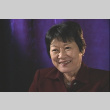
vh
Sue Takimoto Okabe Interview (ddr-densho-1000-74)
Nisei female. Born September 5, 1928, in Tacoma, Washington, moved with her family to Seattle at age four. At age six, began singing, taking voice lessons and performing on stage for Japanese American community events. In 1942, was incarcerated with her family at Puyallup Assembly Center and Minidoka concentration camp, Idaho, where she continued to sing …
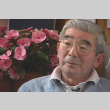
vh
Kunio Otani Interview (ddr-densho-1000-75)
Nisei male. Born July 31, 1921, in Seattle, Washington. Raised in Raymond, Washington. Incarcerated at Tule Lake concentration camp, California, and Heart Mountain concentration camp, Wyoming; he worked on the staff of both camp newspapers, the Tulean Dispatch and the Heart Mountain Sentinel, respectively. Resettled in Seattle after the war and entered the greenhouse business. He …
